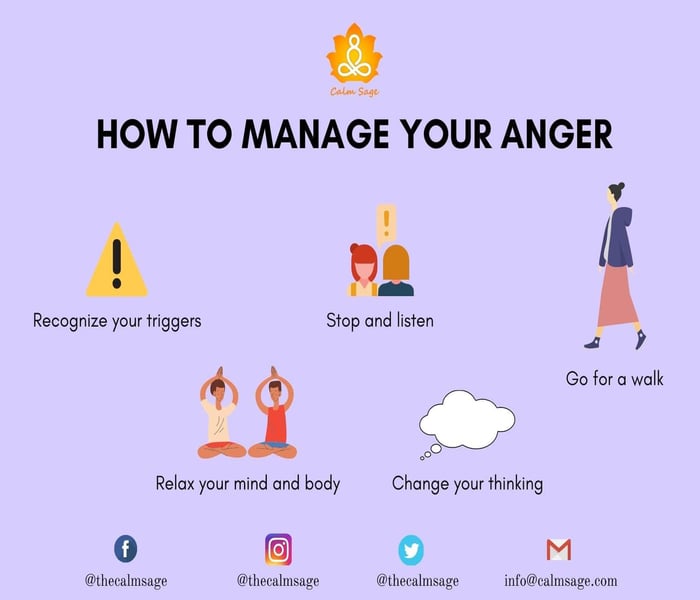10 Anger Management Exercises to Control Anger
Anger Management Exercise to calm your nerves down. Here We are sharing with you 8 Strategies to Control Anger.

“Holding on to anger is like grasping a hot coal with the intent of throwing it at someone else; you are the one who gets burned.” – Buddha
Anger is a very powerful emotion and while releasing anger can be good for our health, it can also become a burden. Anger makes us react irrationally and aggressively and can cause us mental health problems including social isolation, physical distress, and emotional unrest.
There are people who are more prone to anger than others. Conditions of extreme stress, children, and teenagers with mental health disorders, adults with a history of trauma are more likely to have a very strong feeling of anger.
If you need help in how to deal with anger issues, then there are many self-help exercises to control anger you could try at home and work. These anger control exercises can help you reduce your anger and improve your overall well-being.

10 Anger Management Exercise To Calm You Down Fast:
If you are prone to outbursts of anger, these exercises can help you deal with anger issues:
1. Breathe Deep
Our mental health is very closely related to our physical health. When we are angry our breathing gets fast and shallow; this is a way of our body telling us to calm down.
Also Read: RAIN- Mindfulness Tool to Deal With Your Overwhelming Emotions
When this happens, try to breathe slowly and deeper from your core than your chest. Breathe in through your nose and breathe out through your mouth. Repeat this process as required. This can be one of the most effective and easiest ways to control anger and practice anger management.
2. Relax Your Mind And Body

When we are angry, we are letting all the negative emotions run through our mind and body. To control your anger, try to find a comfortable and quiet place, close your eyes and find your “happy place”.
We all have that one place in our minds that, no matter what, helps us relax and put a smile on our faces. Think about that place, all small details, and relax those tensed muscles.
3. Go For A Walk

Exercising regularly is very effective in controlling our stressors and negative emotions. If you feel like you are about to snap at your partner, child, or co-worker, try to walk it off.
Either go for a brisk walk or a run. Physical activity of any kind can be one of the best ways to control anger and stress.
Also Read: One Step at a Time: A Guide to Mindful Walking
4. Identify Your Triggers
Sometimes a simple word from a person or a specific situation can cause us to react aggressively. If possible, try to make an effort to deal with such situations. The point is to identify your triggers to your aggressive behavior and try to control such situations.
5. Listen First

“Think before you speak”
Another way of anger control is to think before you speak. Sometimes our anger makes us jump to conclusions that might not be correct and we might say something mean. This kind of behavior can make us feel regret at the end of the day. To avoid this, make sure you listen first to the other person before responding to them.
Also Read: 7 Simple Ways to Be a Good Listener
6. Replace the Negative with the Positive
As mentioned above, anger can cause us to react irrationally and can make us say something we might come to regret later. To avoid this behavior, try to change your negative thoughts to positive ones.
7. Don’t dwell
The worst thing you could do to yourself is to dwell on situations for a long time. Dwelling on things doesn’t make things easier. It only creates a mountain of negativity until you snap at someone you care about.
To deal with anger issues, try to move on and look at the positive than the negative.
8. Progressive Muscle Relaxation
When you’re angry, another sign can be muscle tension and tightening. Another way to help control your anger is to try progressive muscle relaxation (PMR). This relaxation technique involves slowly and deliberately tensing and relaxing your muscles one by one.
You can start from the top of your head and gradually move towards your chest, abdomen, arms, legs, and toes. Or you can go the other way around.
9. Talk To A Friend
We all have someone in our life who can calm us down when our anger is out of control. If you have such as a person in your life, call them and express your feelings to them. However, venting your anger can also backfire if you’re not careful.
If you don’t have such a person, you can try other cathartic ways to control anger or express your feelings. You can also form a support system that can help you calm down your anger when needed.
10. Try Anger Management Therapy
Anger management therapy is a wonderful tool to help you regulate your anger. It can help you identify the stressors that are causing your anger and provide resources to help control your anger. If your anger is causing troubles in your life, relationships, and profession, then seeking help should be considered.
Did you know that post-traumatic stress disorder can also be linked to aggressive behavior and anger outbursts? Even depression can make it harder for you to control your anger. It is always best to address the underlying cause of your anger to effectively manage your anger.
Also Read: Best Online Anger Management Classes
Questions To Ask A Therapist:
- Are they licensed in anger management?
- Have they worked with people struggling with anger issues before?
- What therapy approaches do they recommend for anger issues or anger management?
- How long will anger management treatment take?
- Does insurance cover anger management classes or therapy?
- How much does anger therapy or anger management classes cost?
Frequently Asked Questions (FAQs)
Q.1 Which exercise is best for controlling anger?
Some of the best exercises to deal with anger issues and anger control include deep breathing exercises and physical exercises. If you find it hard to control your anger, try progressive muscle relaxation, walking, running, or gardening.
Q.2 How do I control my anger?
Anger is a naturally strong emotion and can control the way you think, act, and feel. To control your anger, you need to first, recognize the signs of anger issues, understand (and avoid) your triggers, and apply exercises to control anger. Try deep breathing exercises, PMR, physical exercises, or other cathartic ways to control anger.
Q.3 How can I control my anger during a conversation?
To control anger during a difficult conversation, first, know your signs, then listen carefully to the words spoken, avoid the other person’s emotional dysfunction affecting you, process every spoken word or unspoken gesture, and then think before you speak. Don’t let the other person’s ignorance control your emotions.
Q.4 Is anger a mental illness?
While Anger is not classified as a mental disorder in the DSM-5, it can be a major symptom of many underlying mental health disorders. One of the lesser-known mental health disorders for which anger issues are a major part is intermittent explosive disorder (IED). Anger is a normal, natural reaction to something our minds may find threatening.
Final Words
Managing anger in a healthy way is tough and it takes time. If you feel like your anger is causing you or someone you care about hurt and pain, then try to control your emotion either by yourself or with the help of a professional.
There is therapy available for anger management including cognitive-behavioral therapy and talk therapy. While there are medications available for controlling anger, it is recommended that you consult a physician before taking any medication.
Anger is a strong and powerful emotion that can be healthy. But prolonged anger can create severe mental and physical distress. Practicing these exercises can help you curb your anger and make you feel less stressed and anxious.
If you need help, don’t hesitate to contact your therapist or doctor.
“For every minute you are angry, you are giving up sixty seconds of peace of mind” – Ralph Waldo Emerson
Breathe in. Breathe out.
More Interesting Articles:





















Self awareness is must but Replacing the Negative with the Positive is difficult.